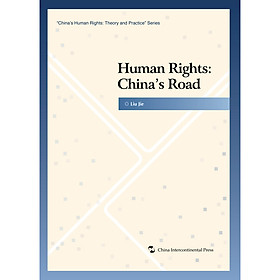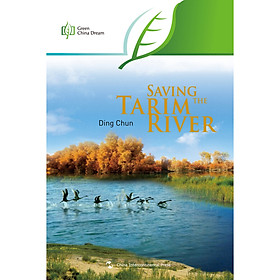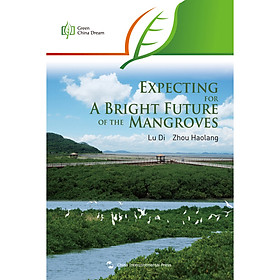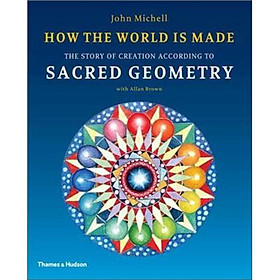Human Rights: China's Road
China started human rights development in a state of general lacking in human rights awareness in the society and serious lacking in human rights guarantee resources in the country, these...
SKU: 7043502830617
China started human rights development in a state of general lacking in human rights awareness in the society and serious lacking in human rights guarantee resources in the country, these conditions determined that China must take a road to human rights suiting to its own national conditions. It is therefore the basic start point of this book to summarize the experience in the human rights development practice in China over the past one century and more, and especially during the past 30 years and more, so as to make theoretical abstraction of the regularity and value exposition of the generality for its inner logic, as a support to China’s road to human rights in rationality and legality.
The China road of human rights is not only a unique road during the past one century and over through the 1911 Revolution, the May 4th Movement, the founding of New China and reform and opening up that always follow the progress in national construction and democratic advancement, but also a dynamic process in continual development and perfection along with the growth of China and the gradually realization of the goal of national rejuvenation. This road is parallel with the development of China and the appeal of rights by the people, as part of the world human rights development with coexistence of multi-lateral cultures and values today, together with the human right development road of other countries and nations.
This book is the personal cognition and understanding of the author on China’s road to human rights, with an attempt to understand the human rights status and inner logic of human rights progress in China from the viewpoint of a human rights researcher with national affections. The author always firmly believes that human right protection is unconditionally agreed and supported by all people conceptually, but the selection of human right protection patterns and routes should not and cannot remain unchanged at all times. For the 1.3 billion Chinese people, only they themselves are entitled to determine how they should protect their own human rights, and how to take a road to human rights suitable to them. This position is carried through this book from the beginning to the end.
Liu Jie, male, born in Neijiang City of Sichuan Province in 1965, and graduated from the Department of International Politics of Fudan University in 1995 with a degree of Doctor of Law. Currently he is the director of Politics and Public Management Research Institute and director of Human Rights Research Center of Shanghai Academy of Social Sciences, a researcher fellow and concurrently engaged as a professor of East China Normal University. He is also a member of the council of China Society for Human Rights Studies and vice chairman of Shanghai Political Science Association. Since 2003, he has been the chief editor of Political Development Progress in China (annual report, a total of 10 volumes have been published), and also worked as chief editor of International Relationships Studies (a total of 23 volumes). Personally he has published 11 monographs including American and International Laws on Human Rights and Human Rights and State Sovereignty, and over 200 academic essays. In recent years he has been mainly engaged in the research on theories about human rights and political development in China.
Chapter Ⅰ China's Road to Human Rights: Connotations, Value and Internal Logic
Ⅰ.Re—discrimination of the basic concept
Ⅱ.Value characteristics of China's road to human rights
Ⅲ.Support for legitimacy
Ⅳ.Internal logic of China's road to human rights
Chapter Ⅱ Historical Veins of Change and Derivation of China's Road to Human Rights
Ⅰ.Dilemma of the autocratic government and the failed attempt to protect human rights in the late Qing Dynasty
Ⅱ.Twists and turns in human rights development in the Revolution of 1911 and the Republic of China period
Ⅲ.Emergence of the new road: human rights development in the revolutionary base period
Ⅳ.Early period of new China: exploration of a new road of human rights protection
V.After the beginning of reform and opening up: gradual formation of the road to human rights with Chinese characteristics
Chapter Ⅲ Theoretical Innovation: Ideological Foundation for China's Road to Human Rights
Ⅰ."Eastward transmission of western sciences" and the introduction of idea of human rights
Ⅱ.Marxist idea of human rights: laying the foundation for building China's view on human rights
Ⅲ.Mao Zedong's idea of human rights: preliminary exploration to the human right theory with Chinese characteristics
Ⅳ.Deng Xiaoping's human right thought "putting people first"
Chapter Ⅳ Chinese Democracy and China's Road to Human Rights
Ⅰ.Chinese democracy: the core value and institutional bedrock of road to human rights
Ⅱ.Chinese democracy and western democracy: different concepts of democracy determine different choices of roads to human rights
Ⅲ.Development orientation of Chinese democracy: providing new target steering for road to human rights
Ⅳ.Chinese democracy demonstrates the institutional advantages of road to human rights
Chapter Ⅴ Protect Human Rights on a Institutionalized and Legalized Track
Ⅰ.The institutionalizing and legalizing process of protection of human rights
Ⅱ.The institutional and legalized protection of human rights
Ⅲ.Upgrade the human right protection in an institutionalized and legalized way
Chapter Ⅵ Embedded Human Right Protection System: the Organizational Forms and Operation Mechanisms of China's Road to Human Rights
Ⅰ.The leading position of the Communist Party of China in human right protection system
Ⅱ.Responsibilities of the government in the human right protection system
Ⅲ.Function embedment: principal composition in the human right protection system of China
Ⅳ.Inclusion of principal resources for human right protection
Ⅴ.Operation mechanism for human right protection
Chapter Ⅶ China's Road to Human Rights Viewed from a Comparative Perspective: Diversified Choices for Human Rights Development in the World
Ⅰ.The spread of the concept of human rights in the world
Ⅱ.Diverse roads to human rights chosen by different countries
Ⅲ.The diversity of civilizations determines different roads to human rights
Ⅳ.Humanitarian intervention: a challenge to the right to choose the road to human rights independently
Chapter Ⅷ The Universal Moral of China's Road to Human Rights.Developing Human Rights in Opening—up and Cooperation
Ⅰ.China is an active participator in the world human right development
Ⅱ.China—US human right dialogue: seeking common views in differences
Ⅲ.Providing diversified selections for human right development: the universal significance of the China's road to human rights
Chapter IX Road to Human Rights in Development: New Situation and New Orientation in Human Right Development
Ⅰ.Empirical achievements of China's road to human rights
Ⅱ.Human rights development ecology in transition
Ⅲ.Double restrictions and dilemmas in transition and human right development in China
Ⅳ.Pushing the construction and growth of the country with human right development
Main References
Postscript
In the late Qing Dynasty, the country became weaker and weaker under the crisis brought by foreign powers' invasion, and could not give people any substantial protection of human rights. At last, the commitment on human rights, instead of saving this falling regime, gave revolutionaries a legitimate reason. After the Revolution of 1911, the new national regime made people long for democracy and human rights, but human rights protection was still empty words because of the autocratic remains and lack of consensus. After World War I, the humiliation suffered by China as a winning country at the Paris Peace Conference undoubtedly led to the outbreak of the May 4u Movement and democracy and human rights began to become a consensus among progressive political forces, but at the level of national political practice, efforts to change this consensus into institutional protection were still naive fantasies. Therefore, in the whole Republic of China period, China's human rights development seemed to be an almost extreme paradox: on the one hand, the national government taking democracy and human rights as slogans for the regime's legitimacy failed to make any serious effort in terms of human rights protection and instead changed into an autocratic government taking suppression of democracy and human rights as its duty for the Kuomintang's and the Chiang family's interests; on the other hand. the Communist Party of China called "communist bandits" took human rights as its political flag from the very beginning, and practiced human rights protection suitable to China's national conditions in its base areas.
In the early 20th century. the rise of Marxism in China constituted the third internal logic of China's road to human rights. This is the fundamental ideological reason why China's road to human rights shows internal features. From the date of establishment of the new Communist Party of China, its revolutionary guidelines and views were deeply influenced by the Soviet Union, but in terms of the value of human rights, unlike the Communist: Party of the Soviet Union which easily allowed the West to protect human rights after the October Revolution and thus later sank into a disadvantaged position in the ideological struggle during the long-lasting Cold War, the Communist Party of China clearly established the pursuit of democracy and human rights as its political guideline from the very beginning, kept forming a good political image in nearly three decades of struggle against the Kuomintang, and won extensive moral support from the people. In the sense of human rights, the three-year War of Liberation finally revealed the people's recognition of the propositions of the Communist Party of China. and the founding of the People's Republic of China was the inevitable result of the people's choice. After the founding of the People's Republic of China, the country continued to attach importance and emphasis to human rights, but regrettably. after China declared it had entered a new period of socialist construction in 1956, the political tradition of respecting human rights was affected in the ideological choice to closely follow the Soviet Union. Because human rights were regarded as a product of capitalism, they were selectively ignored at the level of political principles. People were more willing to believe that under the modern democratic political principle of "people determining their own destiny," the phenomenon of human rights infringement would not emerge. so it was not necessary to specially emphasize human rights protection at the institutional level as a matter of course. This change of course did not mean that China no longer respected and protected human rights. Instead, China was no longer restricted by the concept of human rights under the Western ideology. and attempted to fundamentally realize protection of people's rights with a superior social system. In this sense, perhaps it can be thought that China abandoned the Westem concept of "human rights" in this period, but essential human rights were still protected in China despite the great changes in the mode and concept of protection.
……
Giá sản phẩm niêm yết của Politics & Social Sciences Human Rights: China's Road trên các sàn TMĐT đã bao gồm thuế theo luật hiện hành. Tuy nhiên tuỳ vào từng loại sản phẩm hoặc phương thức, địa chỉ giao hàng mà có thể phát sinh thêm chi phí khác như phí vận chuyển, phụ phí hàng cồng kềnh, ...
Mức giá và các nhà cung cấp được liệt kê tại đây chỉ dùng để bạn tham khảo. Khi quyết định mua hàng bạn cần xem xét thêm về đánh giá của khách hàng tại shop đó. Sau cùng bạn chọn mua sản phẩm từ nhà cung cấp mà bạn cho là uy tín nhất với mức giá hợp lý nhất. Chúng tôi không trực tiếp bán hàng cũng như vận chuyển và không chịu bất kỳ trách nhiệm nào về quyết định mua hàng của bạn.
| SKU: | 7043502830617 |
|---|
















